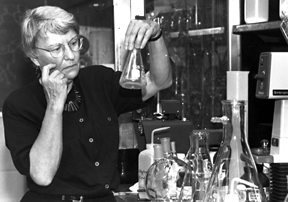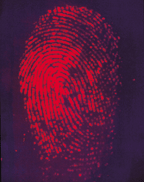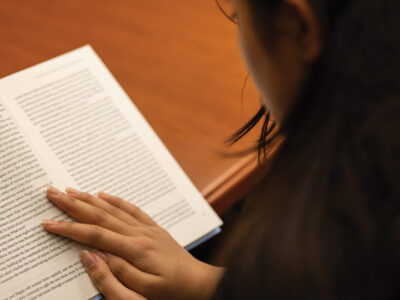
It all began when two well-dressed men poked their heads in the doorway of Dr. Madeleine Joullié’s office several years ago. “They said, ‘We’re from the Secret Service,’ and showed me their identification,” recalls Joullié G’50 Gr’53, Class of 1970 Professor of Chemistry at Penn. “I said, ‘My God, what did I do? Are you going to arrest me?’” What they wanted, however, was the organic chemist’s help in developing a better way to detect fingerprints.

Her collaboration with forensicists eventually paid off in the development of compounds called indanediones—cheaper, more sensitive, and easier to use at crime scenes—and a new patent for Penn. The chemicals, now licensed to a Dutch company, are being used by the Secret Service as well as law-enforcement agencies in Israel, Australia, and Canada.
Joullié says she and former student collaborators, Dr. Olga Petrovskaia Gr’99 and Dr. Diane Hauze Gr’96, stumbled upon the chemicals about three years ago when they were trying a different way of making ninhydrins, which have been used in law enforcement since the 1950s. Both ninhydrins and indanediones react with amino acids contained in the oil on people’s fingertips to illuminate fingerprints. “Ninhydrins are really the standard fingerprinting reagent. But it has certain shortcomings,” she says. “To get the really perfect reagent is like looking for the perfect husband. There are a lot of requirements.” The chemical can’t be toxic, for example, or damage sensitive evidence.
“We made some extremely good ninhydrins, but they never had any commercial application,” Joullié says. “They were just too expensive.” Indanediones are an effective alternative that can be made at a fraction of the cost.
To develop the faintest prints, detectives need only dissolve the powder in alcohol and spray or brush it on a surface, then apply a little heat with a steam iron. Shining a strong light source on the prints will illuminate them even more, making them glow pink.
Born in France, Joullié grew up in Brazil and came to the United States to attend Simmons College in Boston. “My father had a business friend who lived in New York and he wanted to know where you could send girls to get better educated,” she says. “I got shipped there without any looking into it. I wasn’t all that happy there.” Joullié was shocked by the emphasis on parties and didn’t attend them. Studying an old college photograph on her desk, she says, “I was very
serious then—much more than I am now.” This is evidenced by the B-movie poster which hangs on the adjoining wall in a nod to her husband, also a scientist. Its title: I Married a Physicist!
Joullié remained in this country to pursue a career in chemistry, coming to Penn “by accident” and taking a liking to it. Her mentor in the chemistry department gently prodded her to try teaching. “I said ‘I don’t need the money and I don’t like people.’ [But] I found out he was right after I tried it, against my better judgment. I must have liked it, because I’ve done it for 50 years.”
She doesn’t know, however, how much longer she will teach undergraduates. “I find it’s taking too much of my time and maybe the students don’t appreciate it. On the other hand, you know, I enjoy being with young people, and you can get one or two interested and it’s exciting.” Most of her research has focused on medicinal chemistry and the synthesis of anti-cancer drugs and immune suppressants. Working with law-enforcement agents on the fingerprinting project provided a window into a completely different world.
Joullié, who can’t walk into a local hospital without running into a doctor who struggled through the tough exams in her organic-chemistry class, says she has a strange knack for attracting strangers who are convinced she can help them with her expertise. “People show up here and you don’t know where they came from.” It’s one of the reasons the petite chemist keeps her office computer propped on a tall, century-old drafting table. “People walk in and they don’t see me [behind it],” she says with a mischievous laugh. “That’s good.”




